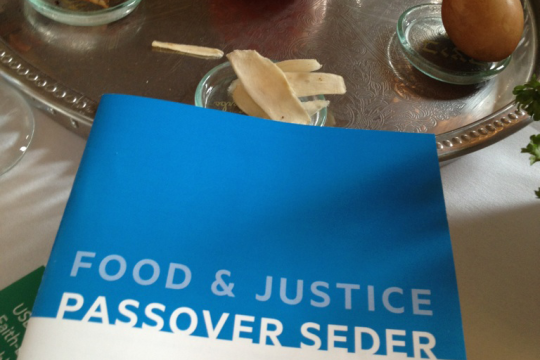
The Union for Reform Judaism's (URJ) 2017 Biennial is less than two months away. When we gather in Boston – December 6-10 – one of our most important responsibilities will be to consider critical resolutions that will shape the future of our movement. That crucial work will culminate in Boston -- but before then, every congregation has a vital role to play.
For more than a century, resolutions have given voice to the URJ’s positions on domestic and international concerns, from Israel to civil rights, from inclusion of people with disabilities to principles of economic justice, and more. Often, they place the URJ at the forefront of issues of the day; always, they ground our positions in Jewish texts and tradition, rooting our priorities in our ancient and ongoing values. At the URJ 2015 Biennial, a resolution on the rights of transgender and gender non-conforming people did all this and more. According to an Associated Press article at the time that compared the resolution to similar ones from other faiths, “None, however, go[es] as far as the one offered by the Union for Reform Judaism.”
Resolutions may be proposed by congregations, URJ affiliates, and commissions, such as the Commission on Social Action. The Resolutions Committee, a broadly representative body, considers each one and recommends actions to the General Assembly. Resolutions do not bind congregations or individual members in any way, but rather reflect shared interests and priorities within the Reform Movement as determined by a representative, decision-making body. (In addition to the Biennial General Assembly, the URJ’s other decision-making bodies include the North American Board of Trustees and its Oversight Committee.)
Our resolutions, an expression of our prophetic faith voice, a pillar of Reform Judaism, help transform our synagogue communities, as well as the broader faith and secular communities of which we are a part. Perhaps most important, URJ resolutions inform what it means to be part of the Union for Reform Judaism.
Copies of the six resolutions that will be considered at the Biennial have been sent to all congregations and the Biennial Resolutions Committee recommends adoption of each one:
- Resolution on Our Community’s Pursuit of Racial Justice
- Resolution on Addressing the Impacts of Climate Change
- Resolution on Redistricting
- Resolution on Responding to the Global Refugee Crisis
- Resolution on School Discipline and Academic Climate
- Resolution on Student-on-Student Sexual Violence in Schools
Congregations may submit proposed amendments to reported resolutions to the Resolutions Committee at least 10 days before the Biennial convenes. To do so, email RAC Associate Director Barbara Weinstein.
We have created a new, additional opportunity for congregational voices to be heard in the resolutions process. We are asking you, as Reform Movement leaders, to encourage your congregations to discuss, debate, and comment on the resolutions before the Biennial. To that end, I encourage you to register now for an important North American-wide conversation about the proposed resolutions on October 24, at 6 p.m. ET. The sponsors of the various resolutions will be available to answer questions and, most critically, to hear your feedback.
A dedicated space in The Tent has been set up to facilitate discussion and debate on each of the resolutions, and includes a specially developed Q&A document for each one. We hope you will use The Tent space to broaden that conversation across the URJ.
In addition, there will be two learning sessions on Wednesday, December 6, at the Biennial that will explore the resolutions in greater depth, serving as another forum to ask questions and share views:
- The first will consider the resolutions on Our Community’s Pursuit of Racial Justice; School Discipline and Academic Climate; and Redistricting will be held at 2 p.m. in Room 203.
- The second will consider the resolutions on Addressing the Impacts of Climate Change; Responding to the Global Refugee Crisis; and Student-on-Student Sexual Violence in Schools will be at 3:45 p.m., also in Room 203.
We expect that by the time the resolutions reach the Biennial floor, and the Resolutions Committee has considered all the feedback provided, the General Assembly will be ready to adopt them without debate. It’s possible, of course, that resolutions may evolve or even be withdrawn during this process.
After the Biennial, the resolutions can help congregations further engage members by bringing them and others in the community together to educate, act, and advocate around critical positions that have been adopted by the Reform Movement.
Have something to say about this post? Join the conversation in The Tent, the social network for congregational leaders of the Reform Movement. You can also tweet us or tell us how you feel on Facebook.
Related Posts

Passover 2024: The Three Central Messages of Pesach

Modern-Day Plagues of Injustice and Inequality

